Virginia Democrats passed a range of environmental reforms while they held power across state government. These measures include transitioning energy production away from fossil fuels, defining environmental justice in state code, incentivizing Virginians to buy electric cars and more.
At the start of this year’s General Assembly session, Republicans promised to take another look at Democrats’ work, with an expressed intent of reworking the Virginia Clean Economy Act.
That’s the sweeping legislation Democrats passed in 2020 that requires the state’s biggest electricity generators to transition from fossil fuels like natural gas to renewables by 2050 or earlier.
Measures to either change how the VCEA is set up or to do away with it entirely were successful in the House of Delegates, but predictably haven’t fared as well in the Senate. A Senate subcommittee recommended that a bill from Del. Nick Freitas (R-Culpeper), which would repeal the Act, be rejected.
Republicans say renewables are currently too expensive and unpredictable to rely on at a large scale. “We’re very concerned about ratepayers under the current system,” Freitas said, echoing concerns raised by Gov. Glenn Youngkin and other Republicans about the related Regional Greenhouse Gas Initiative. A bill to pull Virginia out of that agreement was also quashed by Senators.
At the same subcommittee meeting, a spokesperson for Dominion Energy pointed out that they’ve been planning to transition away from fossil fuels and that repealing the VCEA would require a drastic recalibration of their business plan.
Democrats also recently moved to define ‘environmental justice’ in state law. They declared it to be the policy of the Commonwealth to uphold and promote environmental justice. This concept has not been directly targeted by bills in the same way. Still, advocates say some measures have implications in how EJ law is enforced in the Commonwealth.
"Environmental justice" means the fair treatment and meaningful involvement of every person, regardless of race, color, national origin, income, faith, or disability, regarding the development, implementation, or enforcement of any environmental law, regulation, or policy.
- The Virginia Environmental Justice Act
One change that looks certain to pass at this point, having been approved by both Delegates and Senators, would remove permitting power from state pollution control boards.
In December 2021, the air board went against a Department of Environmental Quality recommendation in rejecting a pipeline compressor station permit.
Republican lawmakers have called the board “activist,” and say it’s making a bad environment for businesses looking to get permits - though they currently are only responsible for ones considered to be controversial.
Senate Democrats attempted to temper the legislation by maintaining public comment requirements for controversial permits, though DEQ would get the final say instead of citizen boards. Activists say they’re glad to have access, but are concerned they won’t get as much of a response from agency officials.
“We need somebody sort of with independence to take a step back and say, ‘Well, this is really controversial, should the permit even be issued?’” said Peter Anderson, who heads policy work in Virginia for Appalachian Voices. “And I don’t think DEQ’s gonna be in a good position to do that.”
The EJ Act is a fairly simple law and is open to interpretation by state agencies in its application.
Republicans have also played a moderating force. They’ve stopped up some attempts by Democrats to expand on their recent work, including the “Driving Decarbonization” program from Del. Rip Sullivan (D-Fairfax) and Sen. Dave Marsden (D-Fairfax).
They’re proposing up to $20 million each year dedicated to building out the Commonwealth’s electric vehicle charging infrastructure to keep up with growing demand.
Sullivan’s bill made it through an initial committee debate, but was later killed without discussion by the House Appropriations Committee. Marsden’s bill, though it passed the Senate, hasn’t been scheduled for discussion in a House committee yet, with a little over two weeks left in session.












